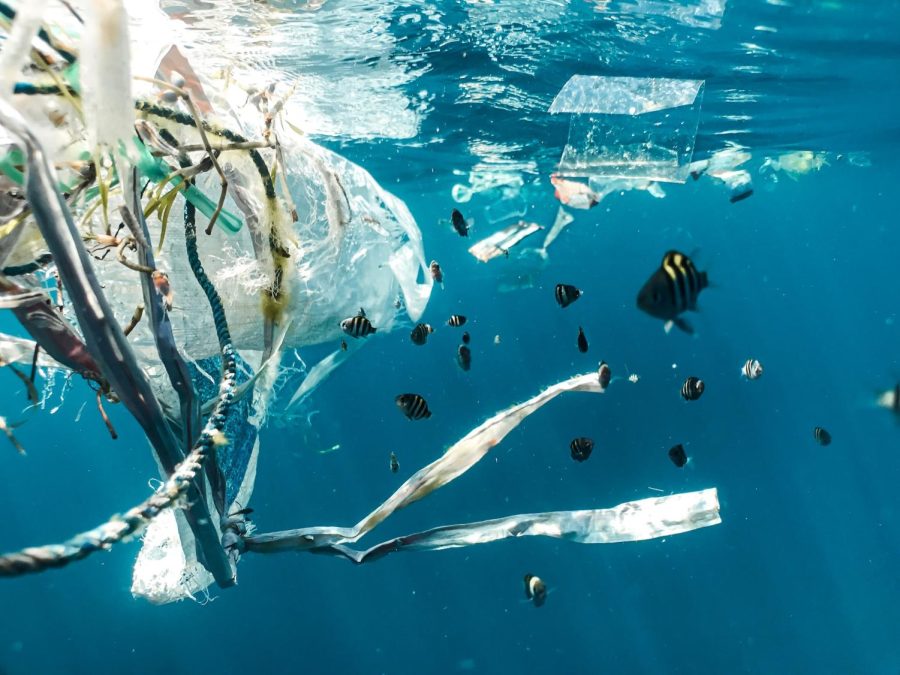We Must Ban Plastic Bags
May 16, 2023
Traveling miles throughout the sea, sperm whales are one of the largest creatures in existence. The 100ft animal can be seen in deep bodies of water, glorifying its essence while they display their dominance and affection towards other animals. This species is among the longest living mammals, playing a significant role in the atmosphere. Sperm whales contribute to the prevention of climate change, capturing carbon released in the atmosphere. While their caring personality is friendly to humans, many people don’t give them the attention deserved. Only a month ago, such a whale washed ashore in Honolulu Hawaii, infused with plastic bags. Researchers found that about 56 percent of whales are consumed with plastic, unable to save the lives of these precious creatures. Due to the amount of debris found in ocean life, sperm whales are in threat of extinction. At only a young age, the beautiful creature leaves behind their family to be killed from human waste . Not all people recognized that this tragedy resulted from their actions. As the endangered species declines in population, ecosystems will deteriorate until there is nothing left. Over the decades, millions of humans have utilized plastic as an alternative for everyday products. When plastic first became widely used, it was seen as practical and cheap, easy to manufacture in many different forms. However, as time grew on, others saw this as a threat to the planet. When buying plastic straws for drinks, or using bags in a market, civilians are unaware of where this trash may end up. Around 300 million tons of harmful plastic is emitted into our atmosphere each year, which is caused by the trash we throw on the streets, and in landfills. One of the greatest sources of pollution is produced from bags used for everyday groceries, and products. The planet has become increasingly contaminated by unnatural chemicals. Plastic bags should be banned everywhere due to the growth rate in pollution, danger for animals living in unhealthy environments, and availability for different alternatives.
Plastic is a non biodegradable substance that takes over 100 years to decompose. Other particles left over can be toxic, creating an indent in our society. This material is widely used around the world, yet not all of these bags are recycled. Throughout many areas in cities, a plethora of bags can be seen hanging on trees, or flying through the side of streets. Most of the trash located on Earth emits 3.4 percent of greenhouse gasses, ending up in the air we breathe each day. As this number continues to increase, so does the warming of our climate . A New York Times article states that 23 billion plastic bags are used in New York alone each year, many of which end up in problematic forms of garbage. They harm marine creatures, clog machines, and make recycling unwieldy. This evidence supports how plastic bags undergo many different consequences which escalate issues with our surroundings. One small action can surge disruption in ecosystems. Without any alternative products, emission numbers will continue to rise. Some states, such as California, enacted this conflict and decided to ban plastic bags in 2016, resulting in a decrease in use of plastic bags by 72 percent. Immediately, civilians notice the change in their atmosphere, feeling cleaner and more sustainable. Not only will the planet be healthier, but humans will become alert of the steps taken closer to sustainability.
In addition, many people may not take into consideration the impact plastic bags have on animals living near landfills or oceans. Bags are one of the most common debris found in water. Sea creatures and land animals consume these products, unaware of its harm. Swimming through the deep sea, more and more trash is disposed of into the home they live in. A recent National Geographic article about Marine life explains how plastic can smell similar to food. Most animals don’t suspect the debris found in water as something non edible. Invasion of wildlife and disturbance of food chains impose a global crisis that is permanently damaged. Scientists found that over a million animals die after being entrapped with plastic. This number will only increase if no laws are enacted banning the use of plastic bags. Once they end up in oceans and forests, animals experience several health issues. Recycling has a rate of five percent for plastic bags, most of which is contaminated with chemicals. Once creatures eat toxic synthetics, the digestive system deteriorates, and the body dysfunctions. Starvation, infections, and loss of nutrition damages harmless animals. One small influence such as consuming plastic products severely affects the life of creatures. As an alternative, properly recycling products that are clean can save millions of lives in the wild. Reducing the amount of single use plastic will create a healthy environment for humans, and wildlife.
Though the idea of banning plastic will benefit environmental factors, customers oppose this statement. Businesses believe that getting rid of plastic bags may lose customers who are trying to buy items. This transition may have people left in chaos, unprepared for shopping. In addition, using eco-friendly bags costs additional money, unengaging them in the idea of sustainability. However, other eco conscious customers adopted reusable bags which have slogans to attract viewers. This makes shopping fun, and signals an economic opportunity. In a New York Times article states, “ ‘It’s been done already in countries all around the world, and if it’s done there, it could be done here,’ Ms. Kande said. ‘Everybody has to make sacrifices. And I know this is much easier for the bourgeoisie than it is for the working class, and it’s going to take some time. But we have to do it. This is an important transition.’ “ (New York Times). This shows how humans are already making efforts to protect our planet, and spread positivity to others. Taking these actions will change views on this topic, and share ideas to help businesses. In addition, by banning plastic bags, stores will lower prices, saving around 30 dollars annually in groceries for customers. Many countries have already agreed to the ban of plastic use. Americans believe that this transition is possible, as long as people are committed to this idea. Though sacrifices will be made, allowing for this outlaw produces positive outcomes.
For generations, our economy has struggled to control emission of fossil fuels in the atmosphere. Companies who promote the idea of using plastic bags point out the pro’s, reminding others that they are lightweight, affordable, and reusable. However, these words can be deceiving, hiding the reality of plastic bag use. If humans continue to use plastic constantly, ocean debris will weigh more than the animals in the sea by 2050. Though we may not realize it, this everyday product impacts millions of lives sprouting in the world we live in. Not only will creatures be intoxicated, but the climate temperatures will dramatically become warmer. Taking one small step in our everyday lives is one great leap towards a safer world.

























